What an uplifting sight to start the day! A field of buttercups. The land to create Streatley Meadows was purchased by the local community in 2011, and has been kept as an open space for the whole village ever since. Like other wild meadows, cattle and sheep graze the land in just autumn and winter and all sorts of rare plants and wildlife have thrived as a result.
Walking a little further down the road in Streatley, I came across a couple of craftsmen just finishing their job, reroofing the thatched roof on one of the village’s timbered cottages. Apparently spring is the prime time of year for this sort of maintenance. Amazing to see such neat, perfect work.
Today I would be walking alone for the 14 miles but there were lots of cute little distractions along the way. Next to a gorgeous willow wicker fence there were plants, pots of jam and free-range eggs for sale, with an honesty box for payment.
The Chilterns are beginning to fade away but the banks of the river are still edged with beautiful big trees .. predominantly willows but also horse chestnuts and poplars, all greening up nicely in the sunshine.
The river takes a turn north at this stage (or more properly south if I were walking it the correct way, I suppose), towards Wallingford. I pass the Beetle and Wedge water-side inn. As another blogger before me has done, I conjecture just how the pub arrived at this name .. an insect sitting astride a lump of cheddar perhaps? ‘In fact the name derives from an old timber wharf that used to stand here. The beetle is the heavy mallet used to drive the wedge into logs, causing them to split so that they could be floated downstream.’ (Anne .. clearly the one we saw was not sufficiently split!)
The houses along the Thames are much more sparse at this stage, save for the occasional one which looks to have been transplanted from South America.
The trail takes a short detour inland through Moulsford, before being reunited with a splendid Brunel viaduct. The brickwork and complicated angles are beautiful to see, even for a non-engineer. I wonder how much the diagonal brickwork must strengthen the bridge.
On the left of the river I pass the boathouse for Oxford Brooks University. The lawn is perfectly manicured and the architecture could be award-winning .. just a shame it’s miles and miles from Oxford itself!
Not long now before I approach the beautiful town of Wallingford, passing the amusingly named ‘Havoc House’ on my way.
Wallingford was strategically important for many years, being the lowest place on the river that was fordable. It has a fascinating kingly history. Fortified earthworks can still be seen around the town. They were built by Alfred the Great to protect Wessex. The town was considered so well-protected that it had it’s own Royal Mint, founded by King Athelstan in the tenth century. Silver coins were made there for over 300 years.
William the Conqueror famously crossed the river at Wallingford in 1066, on his way to be crowned in London. He realised just how important the town was strategically and had a stone castle built to protect it. By the time of the Domesday Book, the town was recorded as being one of only 18 towns in England with a population greater than 2000. And then in 1155 another king, Henry 11 gave the place a Royal Charter .. a full 32 years before London was to receive the same accolade. Not surprisingly, during the Civil War the town was a Royalist stronghold and held up against Cromwell and his Roundheads for 16 weeks. Once defeated, the castle became a prison for many of Charlie’s followers, but so afraid was Cromwell that the prison could be used to incarcerate him if the tide turned, that he ordered the castle to be destroyed.
Wallingford has been peaceful since then, except for the murderous exploits of Agatha Christie who lived here. I also came across this charming little plaque on the front of of a Georgian house in the centre of town. Googling George Dunlop Leslie later in the day, I found that actually he was hugely prolific but really painted more portraits than landscapes. All very sweet, all very Victorian.
Next to the bridge I found the stylish Horizon Blue Mercedes awaiting me .. Cara had arrived to escort me to lunch! How very civilised. She had found a place a little off the beaten track which was reputed to serve fabulous lunches .. and so it did. Superb salmon fishcakes with an accompaniment of rip-roaring Scotch Bonnet sauce, (confusingly from Germany!).
At Benson I’m tempted to take a detour to Ewelme, the little village where Jerome K Jerome is buried. I have frequently thought of his antics on the river as I have walked from Kingston and have dipped into his enduring book on several evenings after a day’s walk. Apparently, the number of pleasure boats on the Thames doubled after his book was published. The only disappointing snippet I have discovered is that Montmorency never actually existed. Boo.
After Shillingford the route takes a detour away from the river. It’s a busy road with traffic works but there are compensations in the form of an amazingly long blooming wisteria hedge.
Reunited with the river I find a tree (not a conifer), from which dangles a single silver Christmas bauble .. how on earth did it get there?
I also pass the most glorious house on the other side of the water as I come close to Clifton Hampden. A yellow lab races up and down the banks, barking at me. I’m surprised he doesn’t leap into the water and forge his way across!
And so to the end of the day’s walk at Clifton Hampden. It’s perfectly still and the reflections of the church and its surrounding trees are beautiful. Today the end of the walk is especially sweet as my husband is awaiting me at the Barley Mow, just arrived off the plane from the States.
Dog of the day is Dillon, who loves people far more than other dogs.
![]()

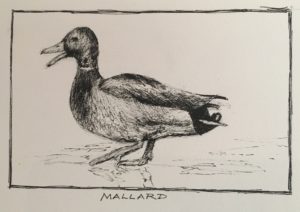
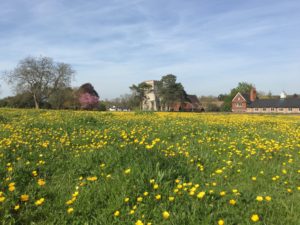
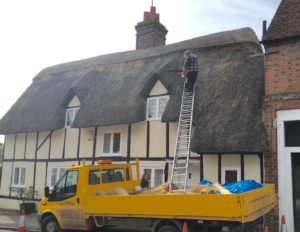
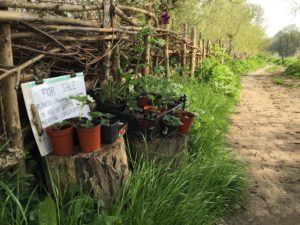
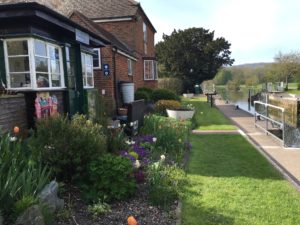
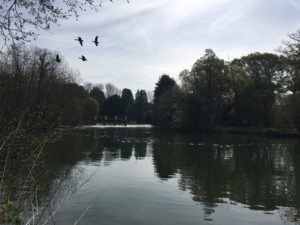
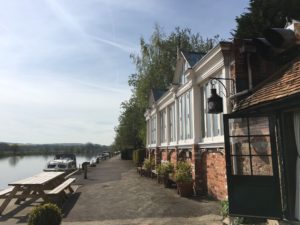
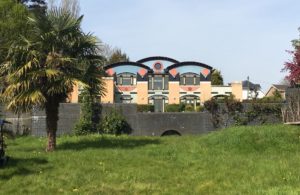
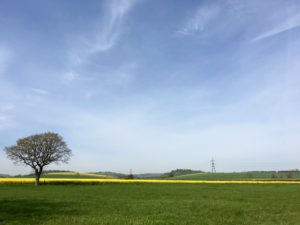
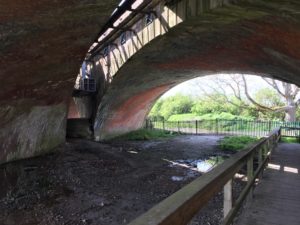
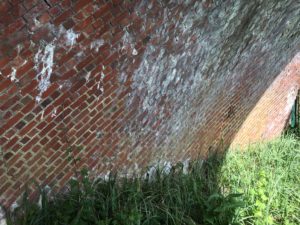
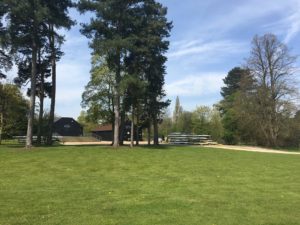
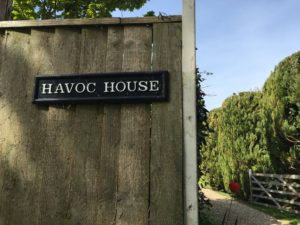
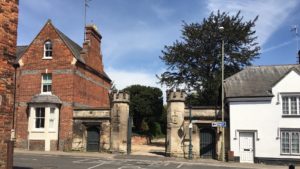
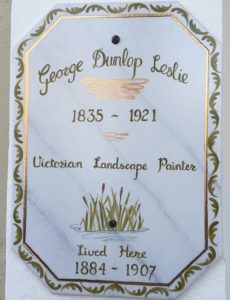
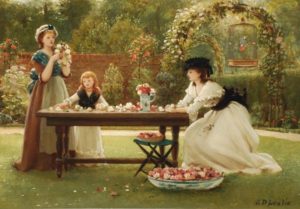
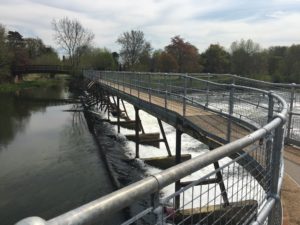
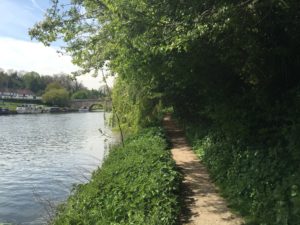

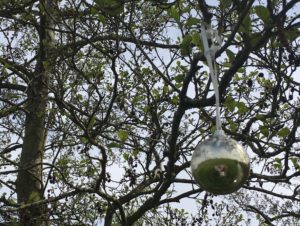
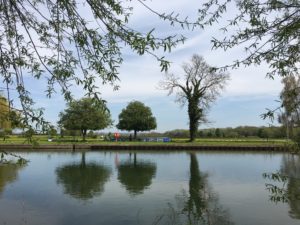
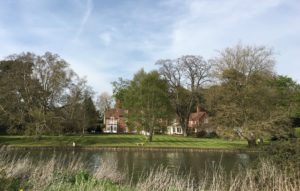
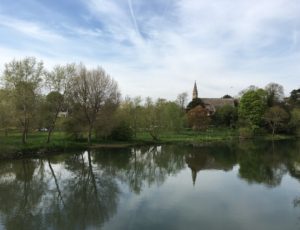
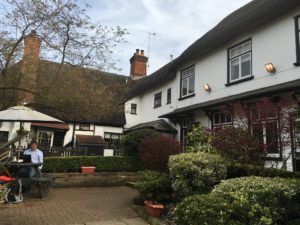

Sounds like you are having a wonderful time. The English countryside is so beautiful, one of my favorite places, I love the right of ways etc, so different from here in the US.
Your illustrations are inspiring!!
You will leave us all in the dust in Muir Woods!
Jules, am I right to assume the frequent pub stops are related to finding the pub with best pickled onions in it’s Ploughman’s Lunch?
How well you know me, Jill!